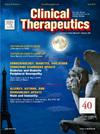Utilization of Immune Checkpoint Inhibitors in Human Epidermal Growth Factor Receptor 2–Negative, Advanced Metastatic, or Unresectable Gastric Cancer Under All Combined Positive Score Grading: Evaluation of Efficacy Based on Individual Patient Data Reconstruction and Secondary Analyses
IF 3.6
4区 医学
Q2 PHARMACOLOGY & PHARMACY
引用次数: 0
Abstract
Purpose
The efficacy of several novel combinations of anti-programmed cell death protein 1 or its ligand antibodies with chemotherapy, which have become the new standard first-line combination therapy with favorable outcomes, was still not certain in patients with different combined positive score (CPS) grades. This research aimed to evaluate the efficacy of immune checkpoint inhibitor immunotherapy or immunochemotherapy at different CPS grades, compared with chemotherapy.
Methods
Kaplan-Meier (KM) curve reconstruction was employed to assess the overall survival (OS) and progression-free survival (PFS) of patients with gastric cancer. The graphical reconstruction algorithm was used to estimate the time-to-event outcomes from Kaplan-Meier curves of the overall cohort or reported subgroups (depending on CPS). KMSubtraction was used to derive the unreported survival data by matching participants in the overall cohort and known subgroups.
Findings
This analysis included 5072 patients in 5 trials (CheckMate 649, KEYNOTE-859, ORIENT-16, KEYNOTE-062, and JAVELIN Gastric 100). Immunochemotherapy exhibited more effectiveness than chemotherapy in most cases. For the overall cohort, sintilimab + chemotherapy exhibited the best effect in OS (hazard ratio [HR], 0.65; 95% CI, 0.55–0.76). Nivolumab + chemotherapy (HR, 0.75; 95% CI, 0.67–0.84), sintilimab + chemotherapy (HR, 0.52; 95% CI, 0.41–0.65), and pembrolizumab + chemotherapy (HR, 0.68; 95% CI, 0.58–0.81) exhibited favorable outcomes in OS in patients with a CPS ≥1, 5, and 10, respectively, and similarly in PFS. Avelumab + chemotherapy performed similarly to chemotherapy in OS but had poor PFS in the reported subgroup.
Implications
Finding suggests that immune checkpoint inhibitors combined with chemotherapy could enrich patients with benefits regardless of CPS grades, though subtle efficacy in low CPS subgroups. This study compared the efficacy of different immunotherapies combined with chemotherapy in patients with gastric cancer, but we acknowledge some differences between reconstructed and original data. Hopefully there will be more research investigating comparisons between current therapies rather than with chemotherapy only in the future.
免疫检查点抑制剂在人表皮生长因子受体2阴性、晚期转移性或不可切除胃癌中的应用:基于个体患者数据重建和二次分析的疗效评估
目的:几种新型抗程序性细胞死亡蛋白1或其配体抗体联合化疗已成为一线联合治疗的新标准,疗效良好,但在不同联合阳性评分(CPS)等级的患者中,其疗效尚不确定。本研究旨在评价免疫检查点抑制剂免疫治疗或免疫化疗在不同CPS分级下与化疗相比的疗效。方法:采用Kaplan-Meier (KM)曲线重建法评估胃癌患者的总生存期(OS)和无进展生存期(PFS)。图形重建算法用于估计整个队列或报告的亚组(取决于CPS)的Kaplan-Meier曲线的时间到事件结果。使用KMSubtraction通过匹配整个队列和已知亚组的参与者来获得未报告的生存数据。结果:该分析包括5项试验的5072例患者(CheckMate 649, KEYNOTE-859, ORIENT-16, KEYNOTE-062和JAVELIN Gastric 100)。免疫化疗在大多数情况下比化疗更有效。对于整个队列,辛替单抗+化疗对OS的效果最好(风险比[HR], 0.65;95% ci, 0.55-0.76)。纳武单抗+化疗(HR, 0.75;95% CI, 0.67-0.84),辛替单抗+化疗(HR, 0.52;95% CI, 0.41-0.65),派姆单抗+化疗(HR, 0.68;95% CI, 0.58-0.81)在CPS分别≥1,5和10的患者中显示出良好的OS结果,在PFS中也是如此。Avelumab +化疗在OS中的表现与化疗相似,但在报告的亚组中PFS较差。研究结果表明,免疫检查点抑制剂联合化疗可以使患者获益,无论CPS等级如何,尽管在低CPS亚组中效果微妙。本研究比较了不同免疫疗法联合化疗对胃癌患者的疗效,但我们承认重建数据与原始数据之间存在一些差异。希望将来会有更多的研究来调查当前治疗方法之间的比较,而不是仅仅与化疗进行比较。
本文章由计算机程序翻译,如有差异,请以英文原文为准。
求助全文
约1分钟内获得全文
求助全文
来源期刊

Clinical therapeutics
医学-药学
CiteScore
6.00
自引率
3.10%
发文量
154
审稿时长
9 weeks
期刊介绍:
Clinical Therapeutics provides peer-reviewed, rapid publication of recent developments in drug and other therapies as well as in diagnostics, pharmacoeconomics, health policy, treatment outcomes, and innovations in drug and biologics research. In addition Clinical Therapeutics features updates on specific topics collated by expert Topic Editors. Clinical Therapeutics is read by a large international audience of scientists and clinicians in a variety of research, academic, and clinical practice settings. Articles are indexed by all major biomedical abstracting databases.
 求助内容:
求助内容: 应助结果提醒方式:
应助结果提醒方式:


